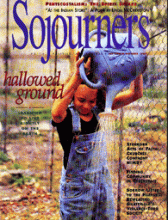I will pour out my Spirit on all people. Your sons and daughters will prophesy, your old men will dream dreams, your young men will see visions. Even on my servants, both men and women, I will pour out my Spirit in those days. - Joel 2:28-29
Ecstatic utterances and miraculous healings, baptisms in the Spirit and in fire, discerning of spirits and interpretations of tongues, "holy laughter" and "slayings in the Spirit." These are some of the characteristics that have caused many Christians to look with suspicion at those sisters and brothers who consider themselves pentecostals or charismatic. Indeed, in the original outpouring of the Holy Spirit upon the grieving followers of Jesus in Jerusalem - when devout men and women of "every nation under heaven" heard the disciples speak in their own languages - the exuberant expressions of the Spirit caused some to say they were "full of new wine" or even crazy (Acts 2:1-13).
Yet with more than 450 million adherents worldwide, pentecostalism is starting to be taken seriously by many religious and social scholars, as well as by other believers. Pentecostalism has now become the fastest-growing Christian group in the world, and there are many signs that a global revival is taking place in their circles.
It isn't just the numbers that are turning heads; also attracting attention is the effect that these zealous pentecostal congregations are starting to have on their surrounding communities and the signs of the future of the church that these groups carry within them. For along with expressions of the Spirit, pentecostals are increasingly becoming known for their radical ways of living and worshiping that are contrary to mainstream social and religious sensibilities and that transcend barriers of race, class, and gender to build hopeful bonds of unity among believers.
Read the Full Article

